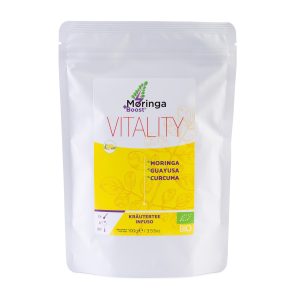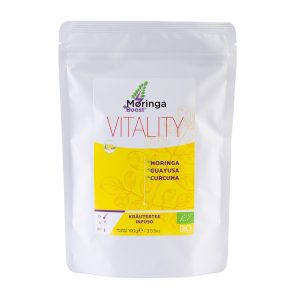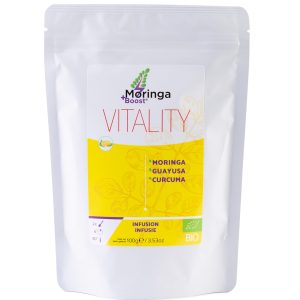As we age, health becomes a major priority. Among the many aspects to consider, maintaining stable blood sugar levels is essential to prevent health problems associated with diabetes and aging.
Blood glucose regulation is key to avoiding serious long-term health problems.
In this article, we’ll explore in detail age-related changes in blood sugar levels, the challenges this poses and the role of moringa, a plant with impressive properties, recognized by European Health Authorities for its ability to help stabilize blood sugar levels.
● Age-related blood glucose levels
Managing blood glucose becomes increasingly crucial with age, especially in cases of insulin resistance.
Aging is a natural process, accompanied by physiological changes. One of these major changes concerns blood sugar regulation. Blood sugar levels are a key factor in metabolic health. As we age, our bodies undergo changes that affect the way they regulate blood sugar levels.
One of the main changes associated with aging is reduced insulin sensitivity. Insulin is the hormone responsible for regulating blood sugar levels. Insulin resistance means that the body’s cells become less reactive to insulin, resulting in higher blood sugar levels. Insulin resistance is one of the main risk factors for type 2 diabetes, a common disease among the elderly.
What’s more, the pancreas’ ability to produce insulin can diminish with age. This double blow to blood sugar regulation can lead to blood sugar spikes after meals, contributing to the development of type 2 diabetes, other metabolic health problems and even cardiovascular complications.
It is therefore essential to take steps to maintain stable blood sugar levels as we age, in order to prevent these health problems.
● Moringa and blood sugar stabilization
Moringa, also known as the “miracle tree” for its many health-giving properties, is native to India and South Asia.
It is also grown in Africa and, more recently, in southern Europe.
Moringa is increasingly recognized worldwide for its health benefits, including its ability to help stabilize blood sugar levels. The amino acids present in moringa play a key role in blood glucose regulation.
Moringa leaves are rich in nutrients, including vitamins (notably vitamin C, vitamin A and vitamin K), minerals (such as calcium, potassium and iron), antioxidants and essential amino acids. One of moringa’s key compounds, quercetin, is known for its role in blood sugar regulation. It helps reduce insulin resistance, promoting better absorption of glucose by cells.
Numerous studies have been carried out to assess the effects of moringa on blood sugar levels, with promising results. Moringa can help reduce blood glucose levels, improve glucose tolerance and reduce insulin resistance. These benefits make moringa an invaluable ally in the fight against fluctuating blood sugar levels, particularly in the aging population.
● European recognition of Moringa for its properties
According to the World Health Organization, moringa is a viable option for the treatment of diabetes.
Moringa has attracted the attention of European health authorities for its benefits on blood sugar levels. The European Food Safety Agency (EFSA) has issued a statement on moringa and its role in maintaining normal blood sugar levels. This recognition means that moringa can be used as a dietary supplement to help stabilize blood sugar levels, offering a natural way to prevent excessive fluctuations.
EFSA has reviewed the available scientific evidence and concluded that moringa consumption can help maintain normal blood sugar levels. This recognition is the result of extensive research into the health benefits of moringa, including its positive effects on blood sugar levels. This is a significant advance for those looking for natural solutions to manage their blood sugar levels.
● How to include Moringa in your diet
If you want to take advantage of moringa’s benefits for maintaining stable blood sugar levels, here are a few ways to incorporate it into your diet:
1. Green smoothies :
Add MoringaBoost PREMIUM Moringa & Acerola Powder to your smoothies for a powerful dose of nutrition. Green smoothies are a great way to consume nutrient-rich leafy greens.
2 teaspoons per serving will give you all the benefits of moringa in your glass.
2. Moringa powder in Recipes :
MoringaBoost PREMIUM Moringa & Acerola Powder can be incorporated into a variety of recipes. You can add it to salads, soups, sauces and cooked dishes. Moringa adds a herbaceous note to your dishes.
Tip: to maintain all its properties, sprinkle over your dishes at the end of cooking.
Have you ever tried substituting moringa powder for basil in your pesto? Its spicy, herbaceous flavour will give all your recipes a kick!
3. Moringa Dietary Supplements :
Taking these key points for the health of seniors as the basis for the development of its range, MoringaBoost has developed SENIORS gel sticks, with a mild, pleasant taste, to be taken in the morning at breakfast, on their own or with yoghurt.
Made with moringa and acerola, they contain the nutrients the body needs to stay in shape: Vitamins A, B1 (Thiamine), C, E, Magnesium and Calcium.
4. Moringa infusion :
MoringaBoost VITALITY infusion, with Moringa, Guayusa and Curcuma, not only helps maintain stable blood sugar levels, but is also an incomparable source of antioxidants, anti-inflammatories and energy.
Pleasantly scented with lemongrass and lemon zest, it is eaten in the morning and at lunchtime. The antioxidants in moringa will protect you from the oxidative stress responsible for cell ageing; the slow-release caffeine in guayusa will boost your energy and concentration; and the anti-inflammatory properties of turmeric will protect your body.
● Other tips for maintaining stable blood sugar levels as you age
Blood circulation can be improved by a nutrient-rich diet and regular exercise. In addition to adding moringa to your eating routine, here are some other tips for keeping blood sugar levels stable:
1. Eat a balanced diet:
Eat a diet rich in vegetables, fiber and lean protein.
Avoid added sugars, processed foods and saturated fats.
2. Regular exercise :
Regular physical activity is a modifiable risk factor that can help control hypertension and blood glucose. It is essential for maintaining stable blood sugar levels.
Exercise helps improve insulin sensitivity and maintain a healthy body weight. Try to combine walking or sports, stretching and strength training exercises for optimum results.
3. Watch your weight:
Maintaining a healthy body weight can help reduce the risks associated with blood sugar levels. Excess adipose tissue can contribute to health problems such as insulin resistance.
Consult a healthcare professional to determine your ideal weight and establish a plan to reach it. Weight loss is often recommended as part of the long-term management of diabetes.
4. Control your stress:
Stress can influence blood sugar levels.
Practice meditation, yoga, mindful breathing or other stress management techniques to reduce stress levels in your life.
5. Monitor your blood sugar levels regularly:
People with diabetes should regularly check their glycated hemoglobin levels. If you are at risk for blood glucose problems, consult a healthcare professional to set up a plan for regular blood glucose monitoring. This will enable you to detect any problems at an early stage.
6. Consult a healthcare professional:
If you have any concerns about your blood glucose levels, consult a healthcare professional. They can help you draw up a management plan tailored to your needs.
● Conclusion
Maintaining stable blood sugar levels as we age is essential for preserving health and preventing the development of diabetes-related illnesses. Long-term management of your blood glucose levels can prevent many health problems associated with aging.
Moringa, a plant with impressive properties, is recognized by the European Health Authorities for its ability to help stabilize blood sugar levels.
By incorporating moringa into your diet, in addition to following a healthy lifestyle, you can take positive steps to stay fit and healthy throughout your life.
Don’t forget to consult a healthcare professional for personalized advice on managing your blood glucose levels. Science continues to reveal the many health benefits of moringa, and it’s exciting to see how this plant can contribute to our well-being as we age.
● References
- Effects of Moringa on reducing glucose levels : Effects of Moringa oleifera on Glycaemia and Insulin Levels: A Review of Animal and Human Studies — PMC — NCBI
- Importance of isothiocyanates in glycemic control: Potential of Moringa oleifera to Improve Glucose Control for the Prevention of Diabetes and Related Metabolic Alterations: A Systematic Review of Animal and Human Studies — PMC
- Beneficial effects of Moringa oleifera on improving blood glucose levels: A Review on the Antidiabetic Properties of Moringa oleifera Extracts: Focusing on Oxidative Stress and Inflammation as Main Therapeutic Targets — Frontiers





